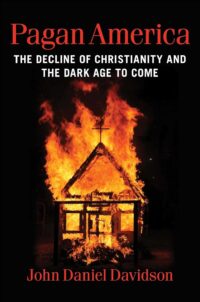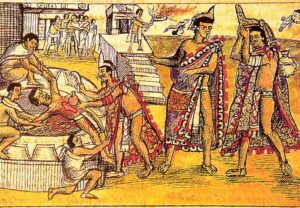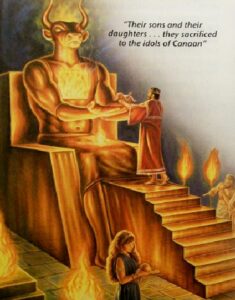
Pagan America – The Decline of Christianity and the Dark Age to Come – Part 1
 Pagan America – The Decline of Christianity and the Dark Age to Come
Pagan America – The Decline of Christianity and the Dark Age to Come
John Daniel Davidson 2024 Regnery Inc.
Paganism in the World, Christianity and America at the end of the 20th Century.
“Some say it is impossible to return to the past, but the truth is that there is now nothing before us, but the choice between two paths which both return to the past. We can return to some sort of (Christian) fellowship, or we can return to pagan slavery. There is no third road.” G.K. Chesterton
This book is a panoramic historical treatise on the pagan world before Judeo-Christian influence, the impact of Christianity in replacing paganism in the Western world, and its modern resurgence. The author painstakingly delineates how the spread of Christianity/Western Civilization liberated souls from slavery, barbarism and misery, and how America is currently discarding its values and principles and retreating to a pagan system.
 Davidson chronicles the steady decline of faith, values and morals over the past century, and like Chesterton, he posits that there is no “Third way.” America is moving away from Christianity towards Paganism, not toward some other system. His case is that there is no other direction. We will descend into paganism, or we will turn back to Christianity and Western World values. And it will get worse before it gets worse.
Davidson chronicles the steady decline of faith, values and morals over the past century, and like Chesterton, he posits that there is no “Third way.” America is moving away from Christianity towards Paganism, not toward some other system. His case is that there is no other direction. We will descend into paganism, or we will turn back to Christianity and Western World values. And it will get worse before it gets worse.
In paganism, truth is relative, not absolute. In the absence of immovable standards of morality, we are therefore free to assign sacred status to powerful people, things and places, rather than God and his commandments. Paganism espouses secularism, materialism and a moral relativism where it is power alone that determines “right”. Paganism can be distilled to the following principles: “Nothing is true, everything is permitted.”
Western Civilization is the culmination of the destruction of paganism and the triumph of faith and Christian morality. Liberal values, sanctity of life, family, self-sacrifice, altruistic behavior, concern and protection for the innocent and weak, advocacy for the less fortunate, are all products of Christianity and dependent on it. None of these existed in the old pagan world and it is a myth that we can maintain those values apart from Christianity and faith.
It is difficult for modern man to understand life in pagan times, because Christian values are completely inculcated into Western culture. The darkest practices of paganism have been covered over by the lie that those cultures were equally valid, and that Christianity imposed colonialist tyranny and even genocide, thus destroying them. In reality the author provides numerous examples of how throughout the pagan world, these cultures participated in human sacrifice, child sacrifice, worship of demons, slavery and brutality. Archaeological evidence of these practices are chronicled in Mexico, South America, Denmark, Nigeria, and various places throughout the world, even though separated by time and geography.

These practices are absent from the history taught in our public schools and universities. Instead, our children are taught that the so-called “noble savage” was pure and morally valid, that these were just alternative cultures worthy of respect. In this world view, colonialism and genocide were Western Civilization’s destructive contribution to the world.
The Aztecs in Mexico participated in ritual butchery and sacrificed as many as 20,000 of their people to their pagan gods every year, killing and torturing children, and participating in mass cannibalism, cutting the hearts out of their victims while alive. On one festival commemorating the construction of a new temple, they sacrificed 80,000 over the course of one 4 day celebration. Hernan Cortez recognized these practices as pure evil and set about destroying them without personal benefit and at great cost.
The author provides stark examples of pagan life in the Roman Empire and Carthage where human sacrifice was prevalent, infanticide was normative, and where slavery permitted those in power to treat their slaves as prostitutes, male or female, to use them as they saw fit, to physically abuse them or kill them and do what they pleased. Power was what determined hierarchy, privilege, and benefit, not moral principle.
Christianity is essentially an inversion of paganism. Pagans established a caste system and slave economy. The author reminds us that slavery was only abolished because of Christianity.
The mystery cults of Babylon and Rome were mechanisms for social control. Pagans sacrificed fellow humans and children to appease their gods, but also to maintain social order by deployment of ritual violence. Christians went to their altars to be born into a new life in Christ. Pagans went to their altars to feed and appease their gods. Christians said that human desires and decisions should be conformed to the desire and will of Christ. Pagans thought desire and will were subject to power and fear, which were tools of the gods. Pagans believed pride was justified, Christians say pride is the greatest sin.
So, what is the logic of paganism? The human sacrifice, the worship of power, the requirement for obedience to the gods. Is there an underlying evil that develops the ravenous desire to dominate and enslave? Is there a spiritual battle that is consistent through time?
The author relates in detail the Old Testament stories and examples of powers and demonic activity in the Middle East and contrasts them with similar activities in other areas. “Parallels exist within all ancient belief systems of the region…and are… the same with nearly every pagan religion, all over the world.” The Israelites and their God Yahweh rejected these entities and practices, and set about casting them out of their nation. Through both the Old and New Testaments, we see Judaism and Christianity refuting and setting right the pagan power narrative. The concept of Imago Dei, that man was created in the image of God, undermines the heart of paganism. Christian ideas that man was made in God’s image, that slave and master were both loved by God and that He imposed the same moral standards for both, are opposite in paganism, which considers slaves less than human and requires them to serve powerful men.

Where paganism seeks to rule mankind through fealty to principalities and powers and spiritual forces, requiring human sacrifice and ritual servitude to themselves, Christ came to overthrow those forces by sacrificing himself on mankind’s behalf. Christianity’s profound differences were obvious and clear from the beginning. The advent of Christianity heralded the end of pagan Rome. As early as the 4th century, the last pagan ruler of Rome was compelled to accept the Christian moral order and vocabulary and compelled pagan priests to care for the poor, a distinctly Christian value. It took centuries for Christian teachings on wealth, slavery and poverty to be accepted and eventually institutionalized in the West. In time, these values would provide the basis for the philosophies of natural rights and natural law, which eventually led to the Declaration of Independence and the US Constitution.
As we observe our culture now, the author says we must ask: If the morality of our entire civilization including relatively modern obsessions with social justice and human rights, rests on a Christian foundation, what happens to our morality if that foundation is de-legitimized and collapses? Is it possible to have Christian morality without Christianity? He answers unequivocally. Without the Christian faith to hold them together, those ideals will dissipate quickly. This transformation is happening now.
Past generations of Americans understood what we owed to the faith of our fathers and realized the importance of passing their legacy to our future generations. Calvin Coolidge, at the 150th anniversary of the Declaration of Independence, called it “the product of the spiritual insight of the people.” America was booming economically and huge advances were being made in science and technology in 1926. Coolidge said, “The things of the spirit come first, and unless we cling to that, all our material prosperity, overwhelming as it may appear, will turn into a barren scepter in our grasp…..we must be like-minded as the fathers who created it. We must not sink into a pagan materialism….. We must follow the spiritual and moral leadership which they showed…”
A world defined almost entirely by power awaits us if we do not heed this warning. The author says that the “lionization of abortion, destruction of the family, sexualization of children and mainstreaming of pedophilia, and the emergence of a materialist supernaturalism as a substitute for traditional religion are all happening right now….”
In the chapter, “How Christian America Unraveled”, he challenges the myth that America was not founded as a Christian nation. The author asks: “How did we get from a society that broadly agreed about the vital role of religion and moral virtue in civic life –and the government’s role in promoting it—to the impossible idea that the government must be absolutely neutral in matters of religion?”
We allowed an idea to take hold that was never intended nor codified by the Constitution. Namely that there is to be a wall between church and state. This is incompatible with the first amendment provisions for religious liberty. This idea from Jefferson’s “misappropriated writings” have taken the force of law even though the expressed intention of the founders was not to prevent religious liberty but to provide an opportunity for it to thrive.
By the mid-20th century, American society had embraced the fallacy that religion is a purely subjective and private matter. He points out that “what initially begins as a claim that the state must be neutral towards religion, ends with an imperative that the state persecute religion in the name of neutrality.”
The author provides an informative review of court decisions that grossly and incorrectly expanded the interpretation of the Establishment Clause. As written, the Establishment Clause simply prohibits Congress from establishing a state church, compelling attendance, levying taxes, interpreting doctrine etc.
Two particular cases, Cantwell and Everson, resulted in censorship of religious expression, such as displaying the 10 commandments on public property, coaches praying before football games, celebrations of Christian holidays in public spaces, making Christmas holiday “winter break”, removing Nativity scenes, taking Bibles out of schools and so on. These court decisions enforced a “wall of separation” between church and state that was never part of the Constitution. Further, they enshrined the concept of religious neutrality (meaning prohibition) and required secular education.
This expanded enforcement of so-called neutrality is at work in all areas of American society, most recently, healthcare. After the Affordable Care Act of 2009 passed, federal bureaucrats redefined “essential health benefits” to include contraception, the abortion pill, as “women’s health”, and insurance companies were forced to provide coverage accordingly. Even private institutions like the Catholic church were denied religious exemptions forcing them to support these policies in violation of their faith. Some of these court decisions have been overturned, but only after 10 years of litigation. There is no guarantee that other cases might be brought in the future.
According to the author, America changed and went through a transformation that left it more “secular, fractured, deracinated and disoriented”. He contends that the Great Depression and WW2 were huge upheavals to American life, culminating in massive population movements into suburbs, women in the workplace, changes in religious attitudes and practices away from moral absolutism and towards secularization and relativism. He mentions the consolidation of public schools into massive institutions, the postwar expansions of colleges and universities through the GI Bill, the introduction of oral contraception, no fault divorce and the sexual revolution. All of these things occurred in the 20th century and brought America to the point where the values that founded it, are no longer acknowledged as valid. America has been redefined from its founding, from a Christian nation of natural laws and rights, to a secular nation with a horrific past.
 The posts are coming!
The posts are coming!


0 comments
Kick things off by filling out the form below.
Leave a Comment